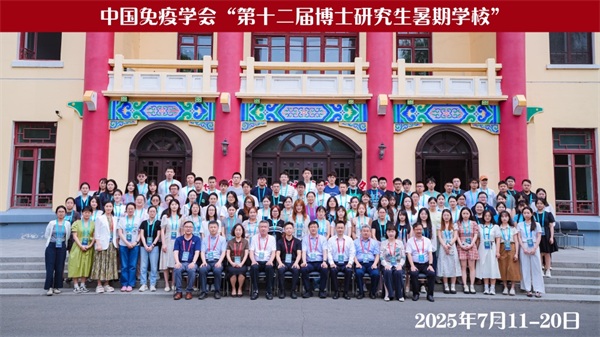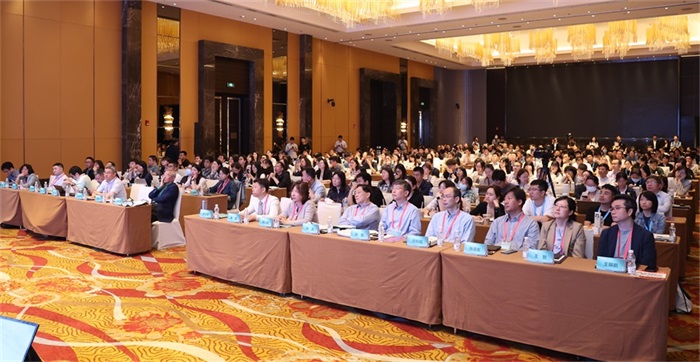Summer School 2025 of CSI
2025-09-15
From July 11 to 20, 2025, the 12th Summer School of the Chinese Society for Immunology (CSI), hosted by CSI and co-organized by Harbin Medical University and the Heilongjiang Society for Immunology, was held in Harbin, Heilongjiang Province.The opening ceremony took place on July 11. Distinguished guests in attendance included Professor Huang Bo, President of CSI and of Peking Union Medical College at the Chinese Academy of Medical Sciences; Professor Ji Yong, President of Harbin Medical University; and Professor Ling Hong, President of the Heilongjiang Society for Immunology and faculty member at Harbin Medical University. The ceremony was chaired by Professor Zheng Limin, Secretary-General of CSI and faculty member at Sun Yat-sen University.In his opening remarks, Professor Huang Bo, speaking on behalf of CSI, extended heartfelt gratitude to leaders, experts, and colleagues who have long supported the training courses in immunology. He warmly welcomed the 90 participants from across the country. Professor Huang emphasized that education, science and technology, and talent are foundational and strategic pillars of China’s modernization. CSI has made sustained efforts to build and select talent in immunology, and these efforts include a range of continuing education programs tailored to both basic and clinical needs. He expressed hope that this year’s Summer School would foster deep exchanges between participants and experts, broaden students’ professional perspectives, and enhance their research capabilities—ultimately injecting fresh momentum into future academic inquiry and scientific innovation.Following the opening ceremony, the program officially entered its lecture phase. A hallmark of the CSI Summer School is the in-depth teaching format: each expert delivers a three-hour lecture followed by an extended Q&A session, during which they thoroughly explain foundational concepts and current research hotspots, while engaging actively with participants. Below are the topics and brief introductions of the lectures delivered by each expert.The first lecturer was Academician Zhang Zemin, Executive Member of CSI and President of Chongqing Medical University. His lecture, titled “Decoding Tumor Microenvironment and Heterogeneity”, explored the use of single-cell technologies to map tumor immune landscapes and analyze the heterogeneity of the human tumor immune microenvironment and its clinical implications. Participants gained a deeper understanding of how precision medicine hinges on cellular-level insights.The second lecturer was Professor Chu Yiwei, Vice President of CSI and faculty member at Fudan University. Her topic, “B Cells and Their Mediated Biological Functions”, provided a systematic overview of B cells’ pivotal role in humoral immune responses, including antibody production, antigen presentation, and their synergistic activation of T cells within specific immune microenvironments. She also traced B cell development from hematopoietic stem cell differentiation, detailing key regulatory factors across developmental stages—laying a theoretical foundation for understanding autoimmune diseases and B cell malignancies.The third lecturer was Professor Shi Yan from Tsinghua University, who spoke on “Initiation and Effects of Innate Immunity”. He focused on the molecular mechanisms underlying the transition from innate to adaptive immunity. His lecture included revisions to textbook content and illustrations, a detailed explanation of the origins of adaptive immune diversity, and the immunological characteristics of different mouse strains. His systematic clarification of foundational knowledge was especially valuable for guiding accurate future learning.The fourth lecturer was Professor Sun Bing, Supervisor of CSI and researcher at the Center for Excellence in Molecular Cell Science, Chinese Academy of Sciences. His lecture, “Type 2 Immune Responses in Pulmonary Asthma and Inflammation: Mechanisms and New Findings”, began with the historical development of Th cells and introduced cutting-edge research on ILC2 cells. Drawing from his own experience, Professor Sun also offered practical advice and feasible research strategies for young scientists, providing meaningful guidance for their academic growth.The fifth lecturer was Professor Fan Chunliang, the designated Party education expert for this year’s Summer School, recommended by the Party Committee of Scientific Societies under the China Association for Science and Technology. A scholar at the Institute of Science and Technology Strategy Consulting, Chinese Academy of Sciences, Professor Fan led a session titled “The Impact of Global Dynamics on Scientific Innovation”. He offered a deep analysis of how shifts in the international landscape strategically affect technological innovation, encouraging participants to reflect on how to conduct effective cross-border research, overcome technological barriers, and ultimately achieve independent innovation in immunological technologies.The sixth lecturer was Professor Xiong Sidong, Vice President of the Chinese Society for Immunology (CSI) and faculty member at Soochow University. His lecture, titled “NAV: Where Are We From and Where Shall We Go?”, focused on the historical development of DNA and RNA vaccines, as well as biomaterials, alongside his team’s recent progress in vaccine research. Professor Xiong also shared the story of CVB3 and highlighted the outstanding contributions of Chinese scientists in virus isolation and cultivation. He concluded by emphasizing the importance of consolidating foundational theoretical knowledge through undergraduate and graduate textbooks, which supports accurate interpretation of experimental results and effective summarization of observed phenomena.The seventh lecturer was Professor Qi Hai, Executive Member and Deputy Secretary-General of CSI, from Tsinghua University. His lecture, “Tracing B Cell Immune Memory: From Germinal Centers to Neural Circuits in the Brain”, began with a problem-driven approach: identifying candidate molecules, pinpointing target genes, discovering cellular differences in immune cells, and finding evidence within the nervous system. Professor Qi encouraged participants to broaden their research perspectives beyond narrow domains, advocating for multi-angle exploration to uncover clues, regulatory pathways, and meaningful insights.The eighth lecturer was Professor Yang Yongguang, Executive Member of CSI and faculty member at Jilin University. His lecture focused on Transplantation Immunology and Xenogeneic Suppression. Starting with the history of transplantation, Professor Yang explained key mechanisms such as T cell responses, NK cell MHC-I incompatibility, and macrophage CD47-SIRPα interactions. He noted the ongoing challenges in meeting clinical organ demand and overcoming barriers in xenotransplantation, calling for persistent efforts to tackle these academic difficulties.The ninth lecturer was Professor Wei Haiming from the University of Science and Technology of China. His lecture, “Development, Differentiation, and Function of NK Cells”, addressed the challenges of identifying new tumor antigens, T cell exhaustion in immune checkpoint therapy, and the lack of novel targets. Professor Wei analyzed NK cell metabolic dysfunction and impairment within the tumor microenvironment, exploring their therapeutic potential. He also introduced new NK cell detection methods and their applications in treating infertility.The tenth lecturer was Professor Wang Honglin from Shanghai Jiao Tong University. Using disease models such as vitiligo and psoriasis, he presented research on the active compound AKBA from the traditional Chinese medicine frankincense. Through chemical modification, his team developed a novel, globally patented molecule with clear therapeutic efficacy, forming a “clinic-to-lab-to-clinic” research loop that enabled clinical translation of scientific findings. Professor Wang’s vivid storytelling inspired participants to seek answers in nature and explore the clinical potential of natural product-based inhibitors.The eleventh lecturer was Professor Zhou Jie, Executive Member of CSI and faculty member at Tianjin Medical University. Her lecture, “Immunopathological Mechanisms of Neonatal Intestinal Inflammation”, began with clinical data on neonatal intestinal immune damage. She explored innate immunity as the primary immune mode in early life and introduced cutting-edge findings on short-chain fatty acids produced by gut microbiota and their role in mucosal immunity.The twelfth lecturer was Professor Jiang Zhengfan, Executive Member of CSI from Peking University. His lecture, “Innate Immunity in Anti-Infection and Anti-Tumor Responses”, reviewed the basic concepts and functions of innate immunity, emphasizing its critical role in combating infections and tumors. He detailed regulatory mechanisms of innate immune signaling pathways and shared insights into how innate immunity defends against viral and bacterial pathogens. In the context of tumor immunity, he discussed the role of innate immune cells in immune surveillance and therapy. Professor Jiang also reminded participants of the importance of experimental details and the value of unexpected results in driving deeper scientific inquiry.The thirteenth lecturer was Professor Zhang Yu, Executive Member of CSI from Peking University. He focused on Resistance Mechanisms and Solutions in PD-1 Blockade Therapy for Cancer. Starting with mechanisms of resistance to anti-PD-1 therapy, he introduced the concept of central immune exhaustion—particularly thymic involution—and shared how targeting the intracellular domain of PD-1 can enhance therapeutic efficacy.The fourteenth lecturer was Professor Zheng Limin, Secretary-General of CSI and faculty member at Sun Yat-sen University. His lecture, “Myeloid Immune Cells and the Shaping of the Tumor Microenvironment”, highlighted the immunoregulatory roles of myeloid cells such as MDSCs and TAMs. He explained how these cells contribute to immune tolerance by secreting suppressive factors and expressing checkpoint molecules, identifying them as promising targets for future tumor immunotherapy strategies.The final lecturer of this year’s Summer School was Professor Huang Bo, President of CSI and researcher at the Institute of Basic Medical Sciences, Chinese Academy of Medical Sciences. His lecture, “Formation of T Cell Memory”, explored how immune cells undergo energy metabolism and how this process influences immune function. Known for his deep conceptual approach, Professor Huang guided participants through foundational questions such as “Why can two molecules pair?” and “What constitutes recognition and interaction?”—encouraging a rethinking of scientific logic and opening new pathways for research and innovation.Ten days of intensive learning and hands-on practice brought comprehensive professional growth in immunology to all participants. Students reflected that the lectures—rooted in each professor’s area of expertise—spanned from macro-level tumor immune regulation to the intricate mechanisms of core immune cells, from immune responses and disease associations to the translational potential of immunotherapy. These were further enriched by discussions on research strategies, national priorities, disciplinary history, and approaches to learning. Together, they formed a multidimensional, cohesive, and intellectually vibrant map of modern immunological knowledge, greatly inspiring participants’ scientific enthusiasm and innovative thinking. Through this experience, students also gained clarity: future research must be grounded in fundamental science, with deep exploration of immune cell regulation, while remaining closely aligned with clinical needs and translational applications. Perhaps this is the most valuable gift of the Summer School—not only the acquisition of knowledge, but the ability to integrate it and chart a purposeful path forward.
Read More












